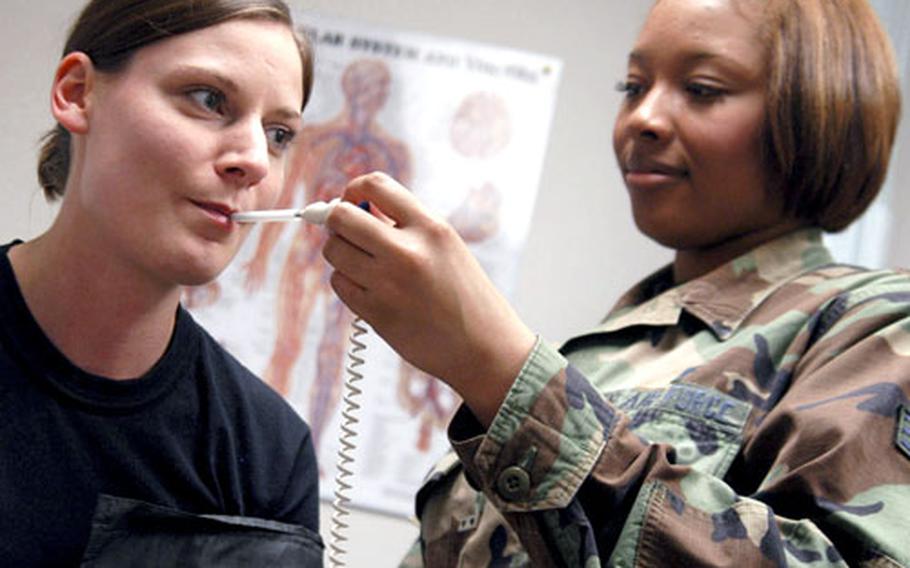
At Kunsan Air Base in South Korea, Senior Airman M’tisha Garnett, right, takes an airman’s temperature during morning sick call, which 8th Fighter Wing medical officials introduced last month. Garnett is a medical technician at the wing’s 8th Medical Group clinic. (Stephen Collier / U.S. Air Force)
PYEONGTAEK, South Korea — Airmen at Kunsan Air Base who wake up with flu symptoms or other aches and pains now can see a doctor the same morning instead of waiting days — sometimes weeks — for a clinic appointment.
Kunsan’s 8th Medical Group clinic has started a daily sick call that allows airmen to show up and be seen for whatever ails them — a sprained ankle, nausea, or other acute but nonemergency ailments.
Sick-call hours are 7:45 to 8 a.m. at the clinic, Building 405, seven days a week including holidays.
Airman suffering such things as chest pains, difficulty breathing or other symptoms of a potentially serious condition always could be seen immediately by clinic staff. But until the new sick call began, calling and scheduling a clinic appointment was the only way to be seen for a nonemergency ailment.
Given the clinic’s crowded appointment calendar, that could mean waiting days or a few weeks to get in.
Nurses would consume much time on the phone trying to gauge whether a caller’s symptoms were routine enough to be handled with an eventual clinic appointment or urgent enough to be seen the same day on a “walk-in” basis, said Maj. Graham Wallace, 8th Medical Group’s medical staff chief.
“Our nurses were on the telephone all day long,” said Wallace. “And, as you might imagine, because we walked patients in, doctors ran behind all the time and patients weren’t terribly happy with that.”
So base medical authorities recently thought they’d try starting a daily sick call. They’re glad they did, Wallace said.
The new procedure is especially helpful at Kunsan, an austere, remote base whose population consists mainly of active-duty servicemembers working at a vigorous training tempo, he said. Kunsan also lacks an emergency room.
The new system and its set hours are saving doctors and nurses a lot of time previously spent tending to walk-in cases that could show up at scattered times during the day, said Wallace.
Those walk-ins still occur but are far fewer now that airmen know a morning sick call is available to them.
The clinic is averaging about 10 sick-call patients daily, Wallace said.
“Boy,” he said of the new sick call, “was it welcome.”